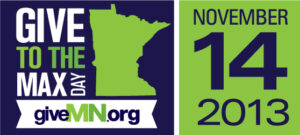At MHAM, we depend on individual donors to support our mission to enhance mental health, promote individual empowerment, and increase access to treatment and services for people living with mental illnesses. You can help us by contributing to MHAM through Give to the Max Day tomorrow, November 14. What’s more, your donation will be matched by our Board of Directors up to $10,000. Simply visit our page at GiveMN.org, enter the donation amount you’d like to make, and follow the prompts to complete the transaction. You will help people like Henry.
The sun shone brightly and the temperature was perfect as Henry made his way to visit family and friends in a nearby community. The world looked good, and Henry drove toward his destination with anticipation boosted by an elevated level of mania. With his history of bipolar, Henry suspected he was feeling so good because was he was becoming manic. He knew that mania often resulted in problems in his life, but he also knew that it felt a whole lot better than those days when he was caught in the grip of depression.
Henry’s good day went downhill fast. Suddenly, he saw flashing red lights behind him. He had stopped quickly at a stop sign and then made a right turn without signaling. A police officer approached Henry’s car. The flashing lights and the uniform caused Henry’s stress level and mania to increase. He started to talk fast and loud. Instead of staying in the car, he tried to exit to explain to the officer. The officer thought Henry had been drinking.
Henry was taken to a detox center where he was tested for alcohol and other drugs. They found he had a very low level of alcohol–well below the legal limit for driving. However, once he was admitted to the detox center, he was stuck there for the next couple of days. Henry had neither his medication for bipolar disorder, nor medication for a separate physical condition. He did not need to be in detox. Henry should have gone to the hospital where he could get treatment for his bipolar disorder.
Henry eventually called MHAM because he was billed by the detox center for his time there. Henry is on Social Security Disability and cannot afford a large medical bill. Moreover, the detox center should be covered under Medicare. Henry and his advocate contacted a Medicare representative, who told them that a bill was not submitted to Medicare for the detox center. The advocate then helped Henry set up some conference calls with the county and the detox center in an attempt to figure out what happened. As it turns out, a police transport brought Henry to a detox center from a neighboring county. The detox center did not bill Medicare, but instead billed the county that transported Henry to the center. The transporting county then billed Henry. After talking to staff in both areas, it was clear that the detox center needed to send the bill to Medicare and not to the transporting county. Henry was pleased that the issue of the bill was resolved. However, a larger issue still stands. This problem would not have come up if Henry had been treated for his bipolar disorder at a hospital or clinic rather than held in a detox center when no detoxification was needed.
